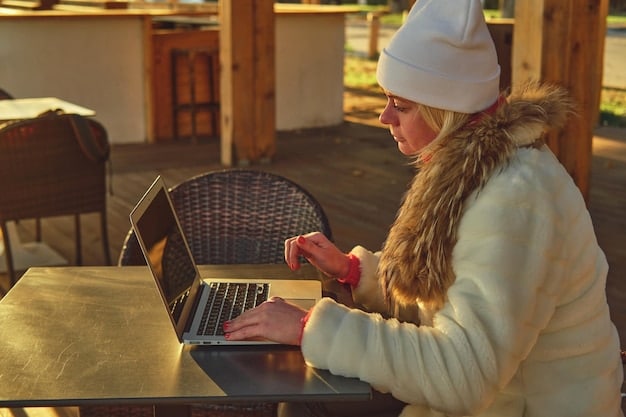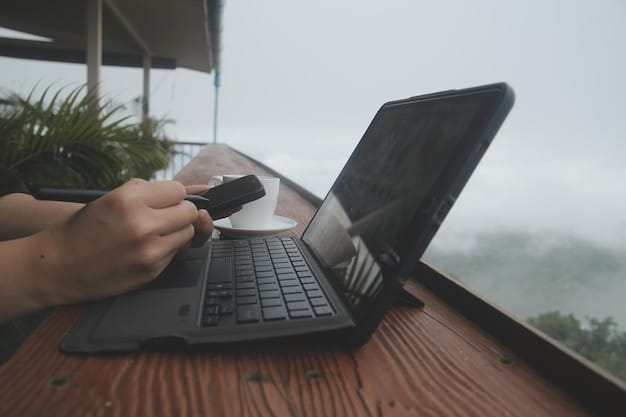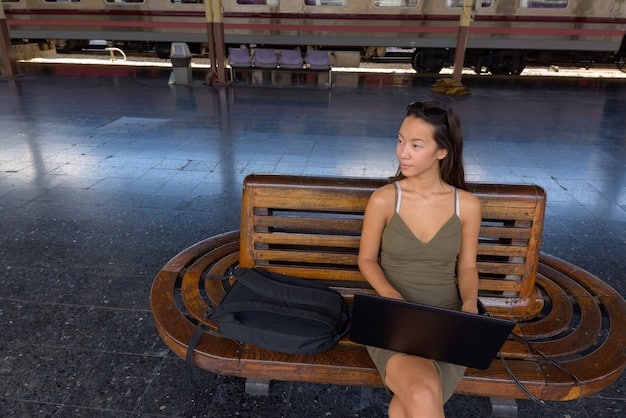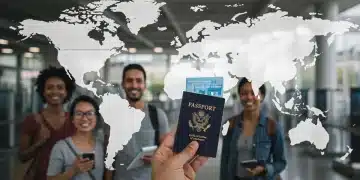Digital Nomad Security: Protecting Your Data and Belongings in the US

Digital nomad security is crucial for safeguarding data and personal belongings while traveling and working remotely in the US, encompassing cybersecurity, insurance, and practical safety measures.
The digital nomad lifestyle offers freedom and flexibility, but it also presents unique security challenges. Navigating the US as a digital nomad requires a proactive approach to digital nomad security: protecting your data and belongings in the US is paramount to enjoying the journey without unwelcome surprises.
Understanding the Risks: Physical and Digital Threats
Before embarking on your digital nomad journey in the US, it’s vital to understand the array of risks you might face. These risks span both physical and digital realms, each requiring specific mitigation strategies.
Physical Security Risks
Physical security encompasses the safety of your belongings and yourself while traveling. This includes theft, damage to equipment, and personal safety in unfamiliar environments.
Digital Security Risks
Digital risks involve threats to your data, online accounts, and privacy. These can range from simple hacking attempts to more sophisticated phishing schemes and malware attacks.
Considering both physical and digital risks is crucial for a well-rounded security plan. Here are some general preventative measures:
- Be aware of your surroundings, especially in crowded or unfamiliar areas.
- Use strong, unique passwords for all online accounts.
- Keep your software and operating systems up to date.
- Back up your data regularly to a secure, offsite location.
By acknowledging these potential risks, you can begin to develop a comprehensive security strategy to minimize your vulnerabilities.

Creating a Secure Digital Workspace
As a digital nomad, you’re constantly working from different locations, which can expose you to security vulnerabilities. Structuring a secure digital workspace is essential.
Securing Your Network
Public Wi-Fi networks are convenient, but they’re also often unsecured. Avoid transmitting sensitive information over public networks whenever possible.
Using a VPN
Consider using a Virtual Private Network (VPN) to encrypt your internet traffic and protect your data from eavesdropping. A reputable VPN service can add an extra layer of security, especially on public Wi-Fi.
To maintain a secure digital workspace, consider the following best practices:
- Always use strong, unique passwords for your Wi-Fi networks and devices.
- Enable two-factor authentication (2FA) whenever possible.
- Be wary of phishing emails and suspicious links.
- Use a firewall to protect your devices from unauthorized access.
Remember, a proactive approach to digital security is your best defense against cyber threats while on the road.
Protecting Your Devices and Data
Your devices are your lifeline as a digital nomad, and protecting them is paramount. Data loss or theft can have significant consequences.
Device Encryption
Enable encryption on your laptop, smartphone, and other devices to protect your data even if they’re lost or stolen. Encryption scrambles your data, making it unreadable without the correct password or key.
Data Backups
Regularly back up your important files to a secure cloud storage service or external hard drive. Consider automatic backup solutions to ensure your data is always safe.
Anti-Theft Measures
Install anti-theft software on your devices that allows you to track, lock, or wipe them remotely if they’re lost or stolen. These tools can provide peace of mind and help you recover your devices.

Protecting your devices and data requires a multi-layered approach. Here are some additional tips to consider:
- Use a laptop lock to physically secure your device in public places.
- Be discreet when using your devices in public to avoid drawing unwanted attention.
- Review the security settings on your devices and adjust them to your comfort level.
By implementing these measures, you can significantly reduce the risk of data loss or theft and ensure your digital assets remain safe.
Insurance and Financial Security
Unexpected events can disrupt your digital nomad lifestyle, highlighting the importance of insurance and financial preparedness.
Travel insurance is a must-have for digital nomads, providing coverage for medical emergencies, trip cancellations, and lost or stolen belongings. Compare different policies to find one that meets your specific needs.
Payment Security
Safeguarding your financial stability while traveling requires vigilance and the implementation of secure practices. A key aspect is protecting your payment methods.
Review your bank and credit card statements regularly for any unauthorized transactions. Report any suspicious activity to your financial institutions immediately.
Securing your insurance and finances involves taking the right precautions:
- Consider digital nomad insurance that covers your equipment, offering compensation for lost or damaged devices.
- Set up fraud alerts on your credit cards to be notified of any unusual spending patterns.
- Keep a separate travel fund to cover unexpected expenses.
With the right insurance coverage and secure financial practices, you can weather unexpected storms and continue your digital nomad journey with confidence.
Staying Safe in Unfamiliar Environments
Exploring new places is part of the digital nomad experience, but it’s essential to prioritize your safety in unfamiliar environments.
Before arriving in a new location, research the area and identify any potential safety concerns. Check travel advisories and read reviews from other travelers. Trust your instincts: if a situation feels unsafe, remove yourself from it.
Emergency Preparedness
It’s crucial to have a plan in place in case of an emergency. This includes knowing local emergency numbers, having a first-aid kit, and informing someone of your whereabouts.
Awareness of Surroundings
Paying careful attention to your surroundings helps to avoid problems. Minimize distractions, especially in unfamiliar areas. Be wary of scams and tourist traps.
To ensure safety in unfamiliar environments, there are several steps you can take:
- Learn a few basic phrases in the local language to communicate more effectively.
- Avoid walking alone at night in poorly lit areas.
- Keep a copy of your passport and other important documents in a separate location.
- Share your itinerary with a trusted friend or family member.
By using foresight and awareness, you can increase your safety and enjoy your travel locations much more.
Legal Considerations for US Digital Nomads
Navigating the legal landscape is an important aspect of being a digital nomad in the US. Understanding visa requirements, tax obligations, and contract law is crucial for staying compliant and avoiding legal issues.
If you’re not a US citizen or permanent resident, you’ll need to ensure you have the appropriate visa to work remotely in the country. Consult with an immigration attorney to determine the best visa option for your situation.
Tax Obligations
As a digital nomad, you may have tax obligations in both your home country and the US. Seek advice from a tax professional to understand your responsibilities and avoid penalties.
Contract Law
When working with clients or businesses in the US, make sure you have a clear understanding of the contract terms and conditions. Consult with an attorney if you have any questions or concerns.
Staying within the legal bounds will make your experience safer and easier:
- Keep detailed records of your income and expenses for tax purposes.
- Consult with a legal professional to review any contracts or agreements before signing.
- Be aware of local laws and regulations in the areas you’re visiting.
By addressing these legal considerations, you can minimize your risk of legal problems and focus on your work and travels.
| Key Point | Brief Description |
|---|---|
| 🔒 Secure Wi-Fi | Always use a VPN on public networks to protect your data. |
| 🛡️ Device Encryption | Encrypt your devices to safeguard your data if lost or stolen. |
| 💼 Travel Insurance | Get a comprehensive travel insurance plan for emergencies and coverage. |
| 🚨 Emergency Plan | Know local emergency numbers and share your travel itinerary. |
FAQ
▼
Using a Kensington lock is an efficient way to physically secure your laptop to tables or desks. This simple measure can deter potential thieves and give you peace of mind when working in public.
▼
Always use a Virtual Private Network (VPN). A VPN encrypts your internet traffic, making it much harder for cybercriminals to intercept your data. Avoid transmitting sensitive information without a VPN enabled.
▼
Yes, it’s vital. Travel insurance can cover unexpected medical expenses, trip cancellations, and lost or stolen belongings. Ensure the policy covers your digital nomad activities, not just basic tourism.
▼
Immediately report the theft to the local authorities and your insurance company. Remotely wipe your device if possible, change all relevant passwords, and notify your bank to prevent unauthorized transactions.
▼
Follow reputable cybersecurity news sources, subscribe to security alerts from your software providers, and check travel advisories from government agencies. Stay vigilant and be aware of the latest threats.
Conclusion
Securing your digital nomad life in the US requires a blend of technical savvy, practical planning, and consistent vigilance. By paying attention to your digital footprint, taking physical precautions, and staying informed, you can enjoy the advantages of this mobile lifestyle with greater confidence. The steps outlined here will help protect you from digital and physical threats.





